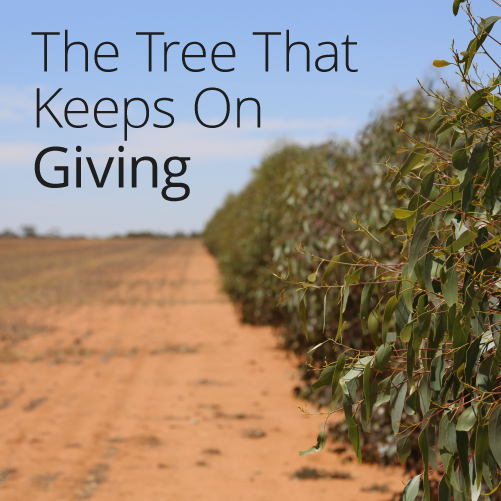Blog
The Tree That Keeps On Giving

Our unique story begins with Eucalyptus kochii (pronounced “koh-chee-eye”), more commonly known as an oil mallee, a species found only in the semi-arid interior of Western Australia. Growing in an ancient and fragile landscape these trees have adapted to this harsh environment thanks to the large, woody swellings at the base of their stems called the lignotuber. Lignotuber is the technical name, but many people would be more familiar with the common name, “mallee root”
The lignotuber not only provides protection for the seeds and buds during fires but also supplies essential nutrients to sustain the tree through periods of stress such as after a fire or during our harsh dry summers.
The ability to continually re-sprout or coppice means that oil mallees can be harvested every two to three years without damaging or destroying the tree. During this period of coppice, the tree continues to help arrest salinity, prevent wind erosion and provide protection and a natural habitat for native flora and fauna.
We only harvest trees grown on farmland and not from native vegetation or wild harvest. The management of these trees is not only important for the sustainability of our operations but also to ensure they continue to play their role in improving the local and global environment. As well as producing eucalyptus oil and remediating farmland the trees continually sequester carbon. Our business model provides for planting new belts of trees on farmland in the wheatbelt of Western Australia to expand our bank of trees and the benefits that they provide. This winter we are planting 120,000 trees on our Kulja farm, this will be followed by a larger planting in winter 2022.
These new tree belts help to provide.
· Shelter belts for livestock and soils giving wind and sun protection.
· A habitat for native insects, fungi, flora and fauna.
· Protection from rising salinity through dropping the water table
After four to six years these trees will be ready for their first harvest adding to bank of mature trees that, once harvested can be re-harvested every two to three years. These trees not only produce the world class kochii eucalyptus oil but contribute to the regional economy, local community and most importantly to the environment.
The story continues as these little kochii seedlings grow into a tree that keeps on giving in so many ways.
 cart
cart